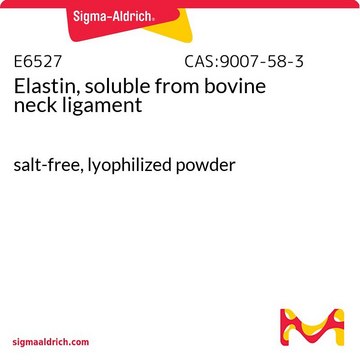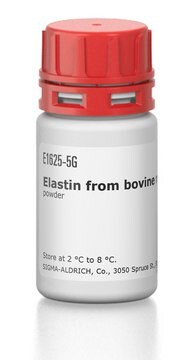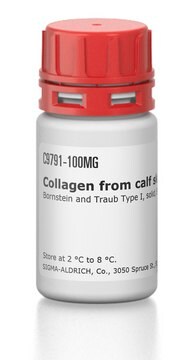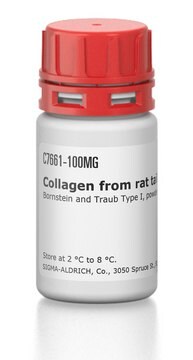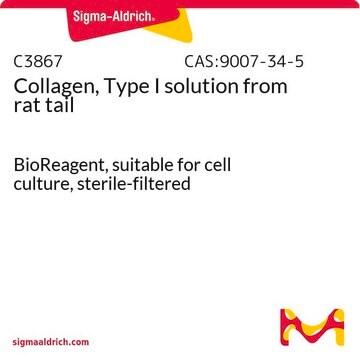T0706
Tropoelastin human
recombinant, expressed in E. coli, 1 mg
Iniciar sesiónpara Ver la Fijación de precios por contrato y de la organización
About This Item
Productos recomendados
recombinant
expressed in E. coli
Quality Level
description
1 mg recombinant human Tropoelastin as lyophilized powder.
sterility
electron beam irradiated
concentration
1 mg
impurities
≤10 EU/mL Endotoxin
storage temp.
−20°C
General description
Tropoelastin is a 60-72 kDa alternatively spliced extracellular matrix protein. It is a soluble precursor of elastin and is distributed in elastic tissues. Tropoelastin consists of an N- terminal 26-amino-acid signal peptide and highly basic strongly conserved C-terminal domain, that is required for both incorporation into elastin and for cellular interactions. It Is also characterized with a hydrophobic domain and exon 26A, which is an unusual highly hydrophilic domain.
Application
Preparation Procedure
Use this procedure as a guideline to determine optimal coating conditions for the culture system of choice.
1. Add 1 ml of sterile 0.25% glacial acetic acid solution to the tropoelastin serum vial containing 1 mg.
2. Mix contents gently until material is completely solubilized. The solution may remain slightly hazy.
3. Transfer desired volume of solution from the serum vial to a dilution vessel if required. Further dilute to desired concentration using sterile 0.25% Acetic Acid solution. A typical working concentration may range from 1 to 50 μg/ml.
4. Add appropriate amount of diluted tropoelastin material to the culture surface.
5. Incubate at room temperature or 37 °C, covered, for approximately 1.5 hours.
6. After incubation, aspirate any remaining material.
7. Rinse coated surfaces carefully with sterile water and avoid scratching surfaces.
8. Coated surfaces are ready for use. They may also be stored at 2-10 °C damp or air dried if sterility is maintained.
Note: To maintain sterility, perform all operations in a laminar flow hood employing aseptic techniques.
Use this procedure as a guideline to determine optimal coating conditions for the culture system of choice.
1. Add 1 ml of sterile 0.25% glacial acetic acid solution to the tropoelastin serum vial containing 1 mg.
2. Mix contents gently until material is completely solubilized. The solution may remain slightly hazy.
3. Transfer desired volume of solution from the serum vial to a dilution vessel if required. Further dilute to desired concentration using sterile 0.25% Acetic Acid solution. A typical working concentration may range from 1 to 50 μg/ml.
4. Add appropriate amount of diluted tropoelastin material to the culture surface.
5. Incubate at room temperature or 37 °C, covered, for approximately 1.5 hours.
6. After incubation, aspirate any remaining material.
7. Rinse coated surfaces carefully with sterile water and avoid scratching surfaces.
8. Coated surfaces are ready for use. They may also be stored at 2-10 °C damp or air dried if sterility is maintained.
Note: To maintain sterility, perform all operations in a laminar flow hood employing aseptic techniques.
Biochem/physiol Actions
Tropoelastin exhibits the property of coacervation and plays a vital role in fiber formation and assembly. Abnormality in the tropoelastin is associated with the development of hereditary disease, cutis laxa (where the elasticity of the skin is lost).
Features and Benefits
Tropoelastin available in its native state. Unique since it becomes cross-linked immediately after its synthesis by the cell and during its export into the extracellular matrix.
Quality
Identity and purity qualitatively determined by SDS-PAGE
Other Notes
Storage at -20 °C prior to solubilization is recommended. Storage at 2-10 °C after reconstitution is recommended.
Shelf life is 24 months when stored at -20 °C. Shelf life after reconstitution is 3 months when stored at 2-10 °C
Shelf life is 24 months when stored at -20 °C. Shelf life after reconstitution is 3 months when stored at 2-10 °C
Storage Class
11 - Combustible Solids
wgk_germany
WGK 3
flash_point_f
Not applicable
flash_point_c
Not applicable
Elija entre una de las versiones más recientes:
¿Ya tiene este producto?
Encuentre la documentación para los productos que ha comprado recientemente en la Biblioteca de documentos.
Domains in Tropoelastin That Mediate Elastin Deposition in Vitro and in Vivo.
Kozel, B., et al.
The Journal of Biological Chemistry, 2378 (20), 18491-18498 (2003)
Jeff Holst et al.
Nature biotechnology, 28(10), 1123-1128 (2010-10-05)
Surprisingly little is known about the effects of the physical microenvironment on hemopoietic stem and progenitor cells. To explore the physical effects of matrix elasticity on well-characterized primitive hemopoietic cells, we made use of a uniquely elastic biomaterial, tropoelastin. Culturing
Nasim Annabi et al.
Advanced materials (Deerfield Beach, Fla.), 28(1), 40-49 (2015-11-10)
A highly elastic hybrid hydrogel of methacryloyl-substituted recombinant human tropoelastin (MeTro) and graphene oxide (GO) nanoparticles are developed. The synergistic effect of these two materials significantly enhances both ultimate strain (250%), reversible rotation (9700°), and the fracture energy (38.8 ±
Coacervation of tropoelastin results in fiber formation.
Cox B A, et al.
The Journal of Biological Chemistry, 249(3), 997-998 (1974)
Tropoelastin.
Wise S G and Weiss A S
The International Journal of Biochemistry & Cell Biology, 41(3), 494-497 (2009)
Nuestro equipo de científicos tiene experiencia en todas las áreas de investigación: Ciencias de la vida, Ciencia de los materiales, Síntesis química, Cromatografía, Analítica y muchas otras.
Póngase en contacto con el Servicio técnico